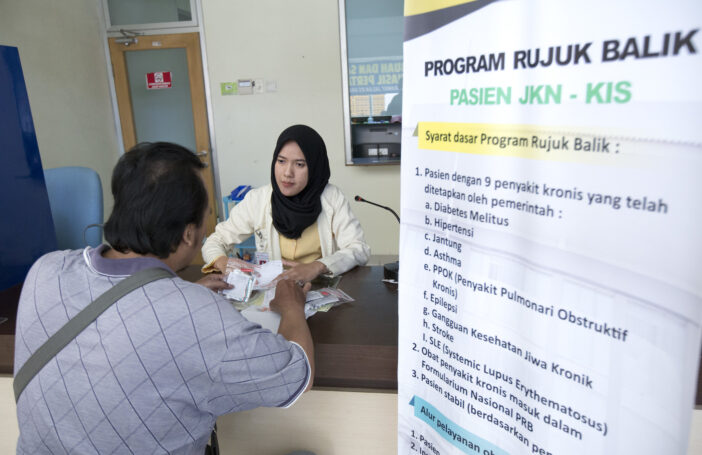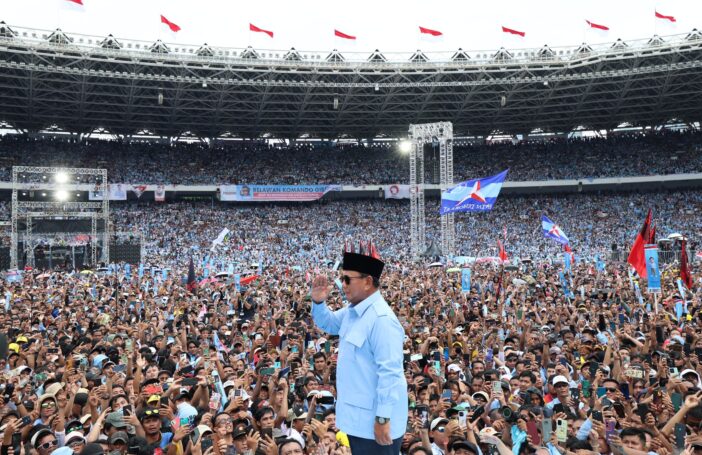The Indonesian government enacted Act 6 of 2014 to decentralise village governance, aiming to improve service delivery at the local level. Under President Jokowi’s leadership, village governments received support through the Village Fund, benefiting 81,616 villages across 38 provinces. The fund has been crucial in enhancing government administration, developing infrastructure and empowering communities.
From 2015 to 2024, the central government allocated a total of IDR609.9 trillion to the Village Fund, demonstrating a strong commitment to rural development. The budget started at IDR20.8 trillion in 2015 and increased rapidly to around to IDR 70 trillion by 2019, at which level it more or less stabilised (Figure 1).

Between 2015 and 2020, village funds led to significant infrastructure improvements, including the construction of 261,877 kilometres of village roads and 11,499 kilometres of bridges, and the establishment of 39,844 village-owned companies. The funds also supported the establishment of essential services such as clean water facilities, health units and early childhood education centres. These initiatives had a positive impact on the quality of life, as evidenced by the decrease in the number of underdeveloped villages from 12,177 in 2021 to 6,803 in 2023, a 44% reduction. The number of impoverished individuals in rural areas also decreased from 17.9 million in March 2015 to 15.3 million in March 2020, reflecting the positive effects of village fund utilisation on poverty reduction.
Despite these successes, there is a troubling aspect to the situation. Indonesia’s Corruption Eradication Commission (KPK) has reported that since the distribution of village funds began in 2015, there have been 851 corruption cases involving 973 individuals — half of whom are village heads. The KPK has stated that this represents the largest ever corruption scandal related to the management of state finances. For example, a former village head in Gembong, Banten Province, misappropriated village funds for personal use, causing a financial loss to the country of over IDR1.38 trillion.
An accountability mechanism, the Sistem Keuangan Desa (Siskeudes) was launched in 2016 to improve financial management capacity among village governments. It aims to simplify reporting and ensure compliance with regulations, establishing a framework of principal-agent relationships among various stakeholders, including the Village Consultative Body (BPD) and district officials as principals and village governments as agents. The implementation of Siskeudes is supported by a 2015 memorandum of understanding between the Ministry of Home Affairs (MoHA) and the Financial and Development Supervisory Agency.
However, Siskeudes faces significant challenges. Limited electricity and poor internet connectivity in many villages hinder its effectiveness. Additionally, many village officials lack the necessary skills to use the system, resulting in weak oversight and opportunities for corruption. In response, MoHA issued a directive in August 2023 to enhance online-based Siskeudes infrastructure. This initiative is part of the “One Data Indonesia” project and requires local governments to support the implementation of Siskeudes, including through infrastructure development and training for village officials.
However, many districts and cities with low tax revenues continue to face challenges in complying with the MoHA directive due to limited budgets and insufficient transfers from the central government. Additionally, many local governments in Indonesia are burdened with monthly mortgage payments to PT Sarana Multi Infrastruktur (Persero), which provided loans during the COVID-19 pandemic period to help boost local economies. Poor coordination between MoHA and the Ministry of Finance (MoF) further complicates matters. MoF can compel local governments to allocate funds for specific programs and they risk losing transfers if they fail to comply.
The central government has initiated several anti-corruption efforts, including capacity building at the village level. In 2017, the KPK and the Ministry of Villages, Development of Disadvantaged Regions, and Transmigration (Kemendes PDTT) launched the Village Youth School program to educate rural youth about village fund management and promote integrity through the Anti-Corruption Village Program. This initiative aims to instil integrity as a core value among village government members and local communities, fostering an environment that discourages corrupt practices.
As Indonesia looks to the future, the role of newly inaugurated President Prabowo, who took office on 20 October 2024, will be crucial. In his campaign and first presidential speech, Prabowo emphasised that village funds will remain a top priority, along with efforts to prevent and combat corruption.
Strengthening anti-corruption efforts is essential for the integrity and long-term viability of village funds. In part, this can be achieved through collaborative integrity networks such as the Forum Koordinasi Pimpinan Daerah (the Regional Leadership Coordination Forum) that include district heads, military and police agencies. These forums must work closely with civil society organisations and BPDs, inspectorates, and District Villages Empowerment Offices to oversee the allocation and use of village funds. By fostering cooperation among these groups, Indonesia can enhance transparency, accountability and integrity at the village level, ensuring that development initiatives truly benefit the communities they are intended to serve.





